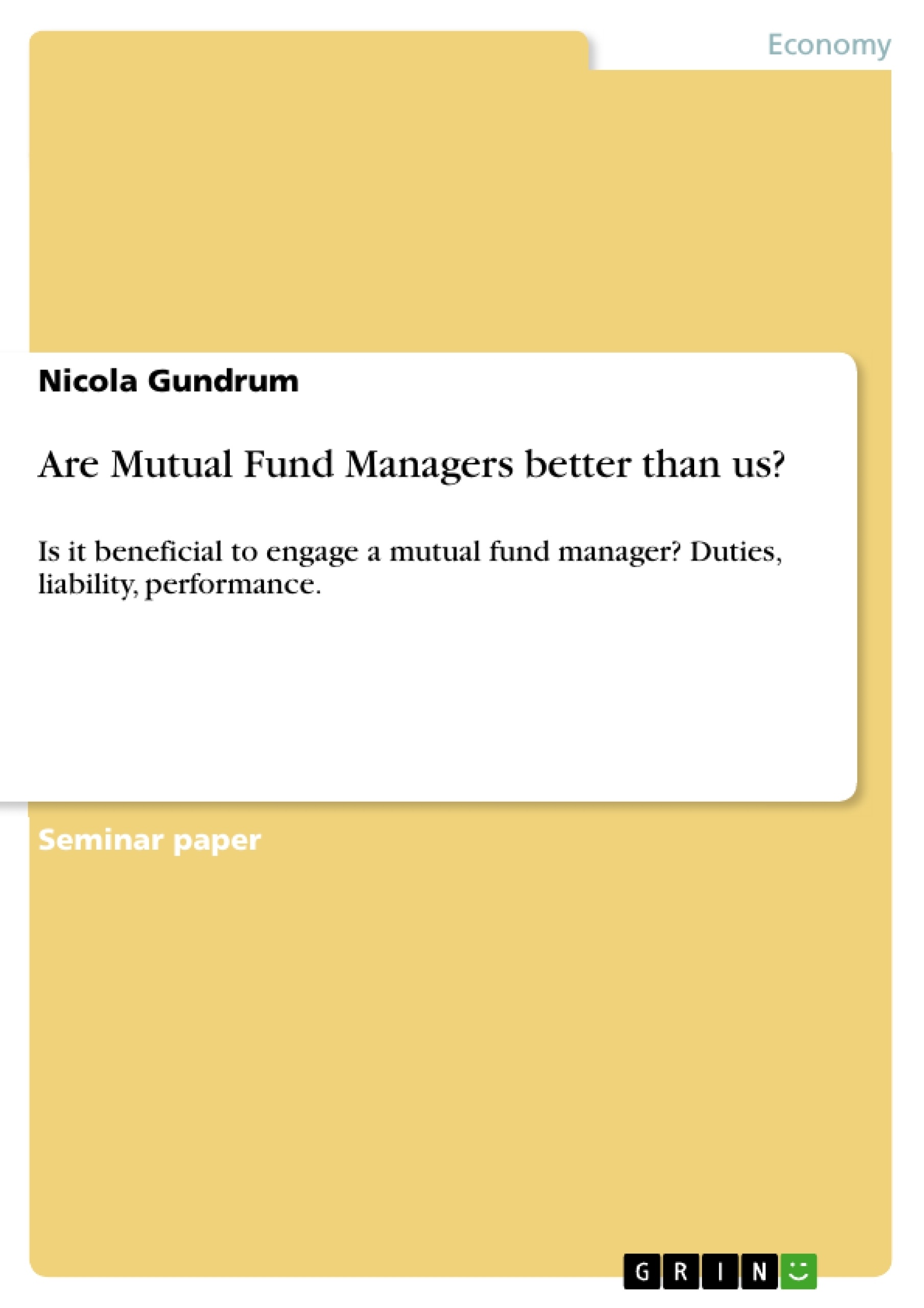Many people want to invest their money with the aim to gain a profit. Some let their capital administrate by mutual fund managers. Others try to invest their money by their own. Is it more effective to engage a professional fund manager or to do it by your own? This question will be analyzed and answered in the following chapters.
Inhaltsverzeichnis (Table of Contents)
- What is a fund manager?
- Duties
- Duty to take care:
- Risk minimization duty:
- Information duty:
- Liability
- Liability according to shareholder
- Liability referring to the state
- Insurance
Zielsetzung und Themenschwerpunkte (Objectives and Key Themes)
This assignment explores the role and responsibilities of mutual fund managers in managing investor capital. The focus is on understanding whether engaging a fund manager offers advantages over self-managing investments. The discussion encompasses the duties, liabilities, and performance of fund managers.
- Duties of fund managers in managing investment funds.
- Legal frameworks and liabilities associated with fund management.
- The role of insurance in mitigating risks for investors and fund managers.
- Comparison of self-managed investments versus engagement of professional fund managers.
- Analysis of performance metrics and benchmarks for evaluating fund management effectiveness.
Zusammenfassung der Kapitel (Chapter Summaries)
The text begins by defining the role of a fund manager and outlining their responsibilities in managing diverse investment portfolios, including money market funds, pension funds, and real estate investment funds. The focus is on enhancing investor returns and navigating investment risks.
The next section dives into the crucial duties of fund managers, emphasizing the importance of aligning actions with investor interests and minimizing potential conflicts. The author discusses key duties such as the duty to take care, the risk minimization duty, and the information duty.
The text then explores the concept of liability, highlighting the legal framework that protects investors from breaches of duty by fund managers. The discussion covers liability according to shareholder rights, the role of the state in oversight, and the limitations of insurance coverage for fund managers.
Schlüsselwörter (Keywords)
Mutual fund managers, investment management, duties, liabilities, performance, risk management, insurance, investor protection, legal framework, benchmarks, investment strategies, financial markets.
Frequently Asked Questions
What are the primary duties of a mutual fund manager?
Fund managers have three main duties: the duty to take care of the capital, the duty to minimize risks, and the duty to keep investors informed.
Is it better to invest personally or use a professional fund manager?
The assignment analyzes this by comparing self-managed investments with professional management, focusing on effectiveness, risk, and professional expertise.
What kind of liability does a fund manager face?
Fund managers can be held liable toward shareholders for breaches of duty and are subject to oversight and liability referring to state regulations.
How is the performance of a fund manager evaluated?
Performance is typically measured against specific benchmarks and metrics that evaluate the returns generated relative to the risks taken.
Does insurance protect investors from fund management failures?
The text discusses the role of insurance in mitigating risks, though it also notes limitations in coverage for certain types of management errors or breaches.
What types of funds do managers typically oversee?
They manage various portfolios, including money market funds, pension funds, and real estate investment funds, depending on the investors' goals.
- Citation du texte
- Nicola Gundrum (Auteur), 2011, Are Mutual Fund Managers better than us?, Munich, GRIN Verlag, https://www.grin.com/document/203397



